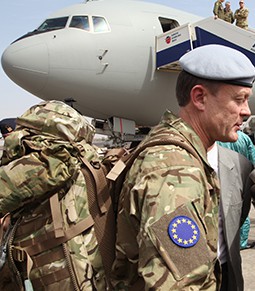The Ukrainian crisis created a rift between the West and Russia due to the annexation of the Russian-speaking Crimean peninsula. The President of Russia, Vladimir Putin, has adopted a “pipeline diplomacy” to promote the Russian national interests. The EU may again become a hostage of a Russia-Ukraine gas dispute (in January 2006 Russia cut off gas supplies only to Ukraine, yet the supplies of many European countries inevitably decreased as well). The EU is supplied with energy from Russia, the North Sea, the Maghreb Union, and the Middle East. The last two regions continue to also present risks, due to political and social instability, Islamic extremist threats, and internal conflicts.
The European Commission released an Energy Security Strategy in May 2014, focusing on short- and long-term proposals and actions. The short-term actions include: market-based approach to guarantee secure supplies, increased energy coordination of the member states, increasing EU’s Gas Coordination Group monitoring in gas supply developments. The long-term measures entail: increasing energy efficiency and reaching the proposed 2030 energy and climate goals, increasing energy production in the EU and diversifying supplier countries and routes, completing the internal energy market and building missing infrastructure links, speaking with one voice in external energy policy, strengthening emergency and solidarity mechanisms, and protecting critical infrastructure.
Implementation of the “Southern Gas Corridor”, which will connect transport and energy links between Europe and the Caspian region, is considered a vital first step towards to European Energy Security. This is a priority for the EU, since it envisages the transportation of gas from the Caspian region to Europe. The main source for the aforementioned project is the Azerbaijani Shah Deniz gas field, from where gas will be exported to Turkey and European markets by expanding the South Caucasus gas pipeline and constructing the Trans-Anatolian (TANAP) and Trans-Adriatic (TAP) pipeline (stretching from Turkey, through Greece and Albania, to Italy).
Furthermore the EU should scrutinize the prospects for gas supplies from the Mediterranean Sea. Technically, the newly-found Israeli and Cypriot deposits are easily accessible to Europe, as they can be carried by the large European-controlled fleet and not necessarily by pipeline. It seems that the three countries involved (Israel, Cyprus, and Greece as “transit state”) could guarantee an uninterrupted gas supply to the EU, as they can provide a strategically secure energy infrastructure.
In addition, an effective European Energy Security strategy could be connected to the creation of a European defense force in order to protect the critical energy infrastructure from modern threats, such as the combined threat of Islamic terrorism and organized crime. A CEPS Task Force report recommends a European Defence Union (EDU), which could be established based on the following parameters: the development of a new European Security Strategy in the context of the broader strategic review of EU foreign policy, the use of the military as a catalyst for an integral approach to the performance of EU treaty tasks related to conflict prevention, crisis management and peacebuilding, and focus on contributing to territorial defence complementary to NATO.
In conclusion, the European Union must understand that the time has come for the implementation of a European Energy Security and an effective Common Security and Defence Policy (CSDP), which is the weakest link in the European integration project. Moscow has realized that the EU cannot efficiently react to an increasingly aggressive Russian policy based on the use of military power. The annexation of Crimea proved the insufficiency of the EU in managing and preventing Russian intervention in the Ukraine crisis. The EU must adopt a realistic policy focus on efforts to materialize alternative energy sources, reducing the dependence on Russian gas, and to create a European defence force. The geopolitical developments (conflict in East Ukraine, Islamic extremist threats, civil war in Middle East countries, broader instability) oblige the EU to adopt a combined and coherent energy security and defence policy, otherwise it will continue to become hostage in energy crises and to passively monitor border changes in its periphery.
 George X.Protopapas is Senior Data Analyst at Palo LTD and Editor at ViaDiplomacy, Greece.
George X.Protopapas is Senior Data Analyst at Palo LTD and Editor at ViaDiplomacy, Greece.


